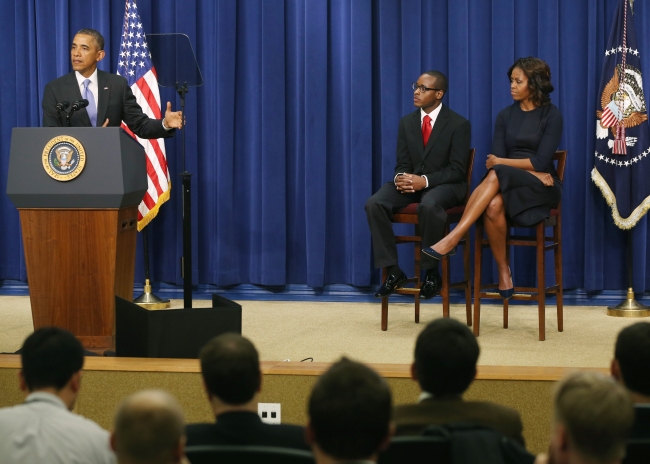You have /5 articles left.
Sign up for a free account or log in.

President Obama addresses college leaders, while Michelle Obama and a student, Troy Wilson, look on.
Getty Images
WASHINGTON -- President Obama and his administration have spent much of the past year pressing colleges to control their prices and contemplating new ways to hold them accountable, much to the consternation of campus leaders. On Thursday, though, he mostly praised them, and they returned the favor.
The events unfolded at a daylong White House summit that assembled more than 100 college presidents and dozens of other nonprofit, corporate and foundation leaders to discuss how to better recruit and graduate more students from low-income families.
While the president urged higher education to do more to expand access to such students, he (and key members of his administration) complimented college leaders on the commitments they had made in that direction -- commitments the administration had won with its invitations to the summit.
Thursday’s summit was, politically, the administration’s latest effort to advance its agenda in a gridlocked Congress. Obama reiterated Thursday that he had (and would use) a "pen to take executive actions where Congress won’t, and I’ve got a telephone to rally folks around the country on this mission.”
For college leaders, the price of admission to the event was to make a “new commitment” to helping more low-income students attend and complete college. More than 100 college presidents and 40 organizations made promises, which the White House unveiled Thursday.
He praised the new commitments by college leaders as “an extraordinary accomplishment,” adding that he “didn’t pass a bill to do it.”
First Lady Advances Her Higher Ed Push
Also speaking at Thursday’s event was First Lady Michelle Obama, who has adopted higher education as one of her policy priorities for the final few years of her husband’s administration. Addressing the college presidents on Thursday, she echoed her remarks from last fall, drawing on her own experiences as an underprivileged student in Chicago.
“If Princeton hadn’t found my brother as a basketball recruit, and if I hadn’t seen that he could succeed on a campus like that, it never would have occurred to me to apply to that school,” she said. “There are so many kids out there just like me -- kids who have a world of potential, but maybe their parents never went to college or maybe they’ve never been encouraged to believe they could succeed there.”
The First Lady praised the college presidents for their passion for helping young people thrive on their campuses, but she also made the case for why they need to expand efforts to graduate low-income, first-generation students. Doing so will not only improve the lives of those students but also strengthen institutions, she said.
“If you embrace and empower these students, and if you make sure they have good campus experiences,” she said. “Then they’re going to stay engaged with your school for decades after they graduate.”
“And they’ll be doing their part when fund-raising season rolls around,” she quipped, to laughter from the audience.
Inequalities in College Advising
Obama also used his address to discuss the importance of education in his own upbringing, something he has previously discussed at length. But he also drew on his current personal experience to draw a contrast between the inequitable quality of college advising that low-income students face.
“We don’t have a level playing field when it comes to so-called standardized tests” like the ACT and SAT, Obama said, describing the advantages that his own daughters enjoy attending their elite private high school here.
“Malia and Sasha, by the time they're in seventh grade at Sidwell School here, are already getting all kinds of advice” on preparing for college, he said. “The degree of preparation that many of our kids here are getting in advance of actually taking this test tilts the playing field. It's not fair. And it's gotten worse.”
Gene Sperling, the president’s top economic adviser who spearheaded the White House education summit, similarly highlighted the advantages that wealth confers to students during the college preparation process.
Among the most significant commitments that Obama highlighted in his remarks, and the administration underscored during the summit, was the doubling of the National College Advising Corps, a program that runs on the Teach for America model of recruiting recent college graduates to delve into underserved high schools and counsel students on how to prepare for and complete higher education. The program will add 129 advisers, which will expand its program by more than a third.
Enjoying the White House Attention
Several attendees praised the White House’s so-called “convening authority” as an effective way for the administration to extract commitments from colleges to do more to help low-income students.
"The president really did a great service by shining a bright light on this American crisis,” said Tim White, chancellor of the California State University System, adding that personal attention of the Obamas to low-income students will make a difference back in California.
"Holy cow, they really care about us," he predicted would be the response of some Cal State students. "That does motivate, particularly first-generation students."
White also said he appreciated that the tone of the event focused on cooperation rather than regulation or legislation, in contrast to many of the administrations other recent encounters with colleges.
The summit was viewed by some as largely a symbolic -- perhaps conciliatory -- gesture by a White House that has, on several occasions, drawn the ire of college presidents who reject the administration’s efforts to hold their feet to the fire on the rising price of college.
Issues of price and accountability for how institutions spend federal money was largely absent from Thursday’s event, except for a passing reference in Obama’s remarks.
“The government is not going to be able to continually subsidize a system in which higher education inflation is going up faster than health care inflation,” the president said. “So I’ve laid out a plan to bring down costs and make sure students are not saddled with debt before they even start out in life.”
The most controversial part of that plan is a proposal to rate colleges based on the value they provide to students. The Education Department is pushing ahead with those plans, and next week plans to gather a group of “technical experts” in Washington to give specific feedback on how best to use technology and data to develop the ratings criteria.
Rather than focusing on those points of tension, however, the public portions of the meeting at times had the feel of a pep rally, and were congenial throughout.
Sperling, in closing the summit, suggested that attendees send him and his White House colleagues recommendations and thoughts in advance of the president’s upcoming State of the Union address -- a venue Obama has in previous years used to put colleges “on notice” about their rising tuition and propose accountability measures. He insinuated that a mention in the prominent speech could await those who have particularly innovative suggestions.
The event also allowed the dozens of participating campus leaders to use the stature of White House attention to bolster publicity for their campuses. College press offices eagerly shot out advisories about their commitments, and a handful of presidents held a news conference against the backdrop of the West Wing.
Presidents snapped photos of the President and First Lady on their phones and iPads. Several dozen presidents met with top administration officials in an off-the-record dinner sponsored by the Lumina Foundation on Wednesday night. And at least one enjoyed a trip to the conference on Air Force One.
All in all, the day was a lot more enjoyable for the college leaders than many of their recent encounters with the executive branch have been -- and some of their subsequent brushes are likely to be.








